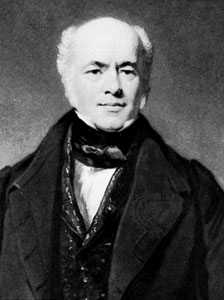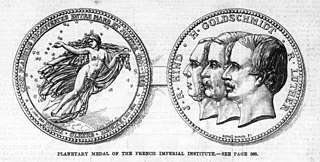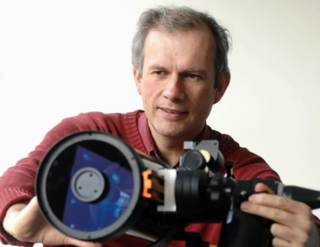
Francis Baily was an English astronomer. He is most famous for his observations of "Baily's beads" during a total eclipse of the Sun. Baily was also a major figure in the early history of the Royal Astronomical Society, as one of the founders and as the president four times.

Urbain Jean Joseph Le Verrier FRS (FOR) HFRSE was a French astronomer and mathematician who specialized in celestial mechanics and is best known for predicting the existence and position of Neptune using only mathematics.

John Couch Adams was a British mathematician and astronomer. He was born in Laneast, near Launceston, Cornwall, and died in Cambridge.

The Royal Astronomical Society (RAS) is a learned society and charity that encourages and promotes the study of astronomy, solar-system science, geophysics and closely related branches of science. Its headquarters are in Burlington House, on Piccadilly in London. The society has over 4,000 members, known as fellows, most of whom are professional researchers or postgraduate students. Around a quarter of Fellows live outside the UK.

Henri Alexandre Deslandres was a French astronomer, director of the Meudon and Paris Observatories, who carried out intensive studies on the behaviour of the atmosphere of the Sun.

Hermann Mayer Salomon Goldschmidt was a German-French astronomer and painter who spent much of his life in France. He started out as a painter, but after attending a lecture by the famous French astronomer Urbain Le Verrier turned to astronomy. His discovery of the asteroid Lutetia in 1852 was followed by further findings and by 1861 Goldschmidt had discovered 14 asteroids. He received the Gold Medal of the Royal Astronomical Society in 1861 for having discovered more asteroids than any other person up to that time. He died from complications of diabetes.
The Eddington Medal is awarded by the Royal Astronomical Society for investigations of outstanding merit in theoretical astrophysics. It is named after Sir Arthur Eddington. First awarded in 1953, the frequency of the prize has varied over the years, at times being every one, two or three years. Since 2013 it has been awarded annually.
The Jackson-Gwilt Medal is an award that has been issued by the Royal Astronomical Society (RAS) since 1897. The original criteria were for the invention, improvement, or development of astronomical instrumentation or techniques; for achievement in observational astronomy; or for achievement in research into the history of astronomy. In 2017, the history of astronomy category was removed for subsequent awards and was transferred to a new award, the Agnes Mary Clerke Medal.
Dame Carole Jordan,, is a British physicist, astrophysicist, astronomer and academic. Currently, she is Professor Emeritus of Astrophysics at the University of Oxford and Emeritus Fellow at Somerville College, Oxford. From 1994 to 1996, she was President of the Royal Astronomical Society; she was the first woman to hold this appointment. She won the Gold Medal of the Royal Astronomical Society in 2005; she was only the third female recipient following Caroline Herschel in 1828 and Vera Rubin in 1996. She was head of the Rudolf Peierls Centre for Theoretical Physics at the University of Oxford from 2003 to 2004 and 2005 to 2008, and was one of the first female professors in Astronomy in Britain. She was made a Dame Commander of the Order of the British Empire in 2006 for services to physics and astronomy.
Philip Christopher England FRS is a British geophysicist and former Chair of Geology at the Department of Earth Sciences, University of Oxford, whose research centres upon the evolution, deformation and metamorphism of mountain ranges and the development of island arcs. He has widely used applied mathematics to model mountain building, proving that they behave as extremely viscous fluids.
The Herschel Medal is awarded by the Royal Astronomical Society (RAS) for "investigations of outstanding merit in observational astrophysics". It is awarded for a single piece of work so that younger scientists can be candidates for the award. It is named after the RAS's first president, William Herschel. The medal was first awarded in 1974. From 1974 to 2004 the Herschel Medal was only awarded every three years. From 2004 the frequency was shortened to two years and from 2012 it will be awarded annually. The medal has been shared twice, in 1977 and 1986. It has been awarded 23 times to a total of 25 people, mostly from the UK.

The Chapman Medal is an award of the Royal Astronomical Society, given for "investigations of outstanding merit in the science of the Sun, space and planetary environments or solar-terrestrial physics". It is named after Sydney Chapman (1888–1970), a British geophysicist who worked on solar-terrestrial physics and aeronomy. The medal was first awarded in 1973, initially on a triennial basis. From 2004-2012 it was awarded biennially, and since 2012 has been annual.
Price Medal is a medal of the Royal Astronomical Society, for investigations of outstanding merit in solid-earth geophysics, oceanography, or planetary sciences. The medal is named after Albert Thomas Price. It was first awarded in 1994 and was initially given every three years. In 2005 this switched to every two years, and from 2014 it has been awarded every year.
Andrew Christopher Fabian is a British astronomer and astrophysicist. He was Director of the Institute of Astronomy, University of Cambridge from 2013 to 2018. He was a Royal Society Research Professor at the Institute of Astronomy, Cambridge from 1982 to 2013, and Vice-Master of Darwin College, Cambridge from 1997 to 2012. He served as president of the Royal Astronomical Society from May 2008 through to 2010.

The planet Neptune was mathematically predicted before it was directly observed. With a prediction by Urbain Le Verrier, telescopic observations confirming the existence of a major planet were made on the night of September 23–24, 1846, at the Berlin Observatory, by astronomer Johann Gottfried Galle, working from Le Verrier's calculations. It was a sensational moment of 19th-century science, and dramatic confirmation of Newtonian gravitational theory. In François Arago's apt phrase, Le Verrier had discovered a planet "with the point of his pen".

Astronomy & Geophysics (A&G) is a scientific journal and trade magazine published on behalf of the Royal Astronomical Society (RAS) by Oxford University Press. It is distributed bimonthly to members of the RAS.

Hiranya Vajramani Peiris is a British astrophysicist at the University of Cambridge, where she holds the Professorship of Astrophysics (1909). She is best known for her work on the cosmic microwave background radiation, and interdisciplinary links between cosmology and high-energy physics. She was one of 27 scientists who received the Breakthrough Prize in Fundamental Physics in 2018 for their "detailed maps of the early universe."
John Henry Woodhouse is an English geophysicist, Emeritus Professor in the Department of Earth Sciences at the University of Oxford.

Thomas Richard Marsh (1961–2022) was a highly regarded astronomer and astrophysicist working in the field for four decades, recently specialising in the accretion and evolution of binary star systems.











